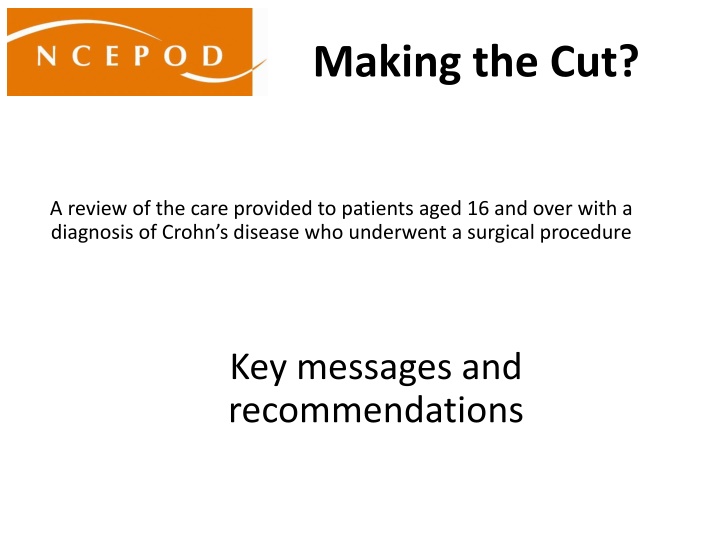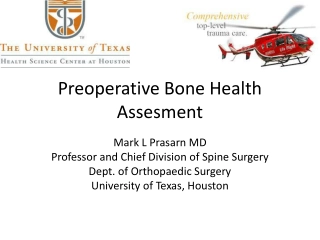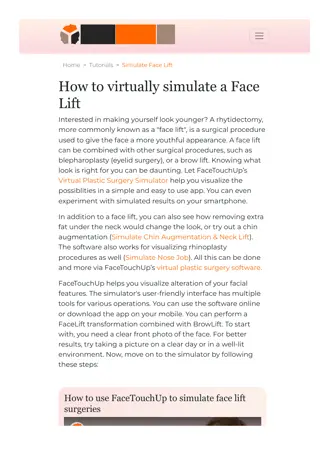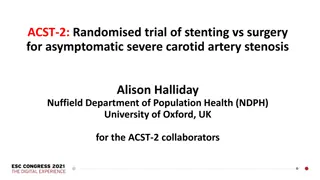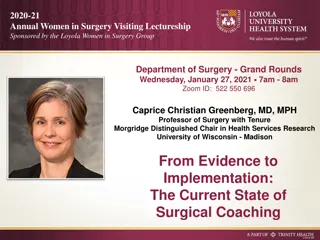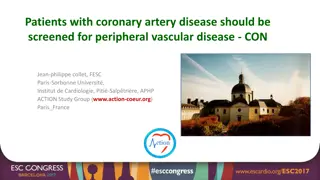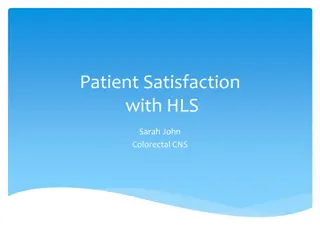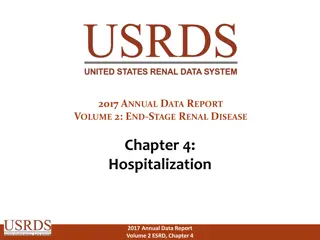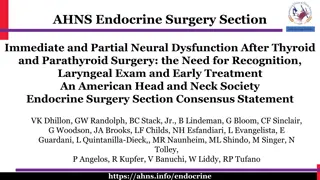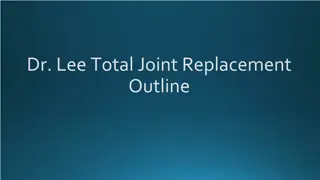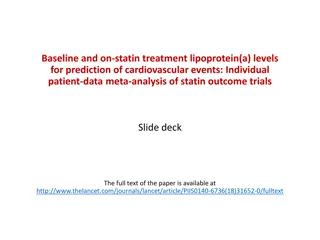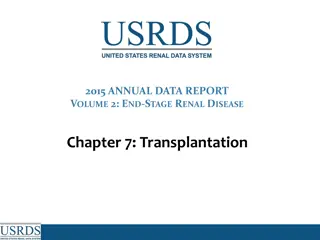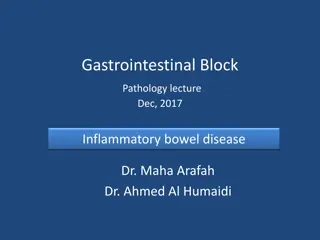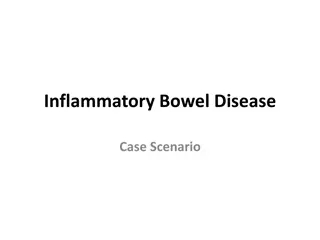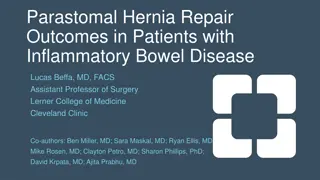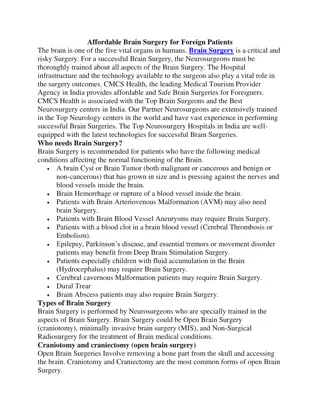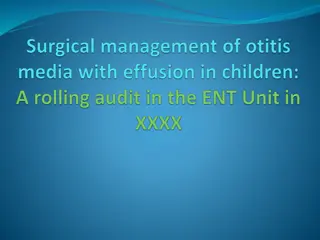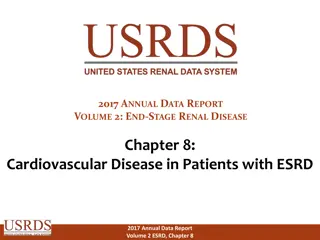Review of Care for Crohn's Disease Patients Undergoing Surgery
This review assesses the care provided to patients aged 16 and over with Crohn's disease who underwent a surgical procedure. Key messages include providing holistic support, effective medication management, considering surgery as a treatment option, and prompt surgical interventions. Recommendations aim to improve overall quality of care for this patient population.
Download Presentation

Please find below an Image/Link to download the presentation.
The content on the website is provided AS IS for your information and personal use only. It may not be sold, licensed, or shared on other websites without obtaining consent from the author.If you encounter any issues during the download, it is possible that the publisher has removed the file from their server.
You are allowed to download the files provided on this website for personal or commercial use, subject to the condition that they are used lawfully. All files are the property of their respective owners.
The content on the website is provided AS IS for your information and personal use only. It may not be sold, licensed, or shared on other websites without obtaining consent from the author.
E N D
Presentation Transcript
Making the Cut? A review of the care provided to patients aged 16 and over with a diagnosis of Crohn s disease who underwent a surgical procedure Key messages and recommendations
The study To identify remediable factors in the quality of care provided to patients aged 16 and over with a diagnosis of Crohn s disease who underwent an abdominal surgical procedure. Organisational questionnaire Clinician questionnaire Case note review Patient online survey
Study population Inclusion criteria Patients aged 16 years and older, who had a diagnosis of Crohn s disease and an elective or emergency admission to hospital for a stay of 48 hours or longer during which time they underwent intestinal surgery. Sampling period 1st September 2019 to 29th February 2020 inclusive (prior to the COVID-19 pandemic, as cases were rising) and 1st September 2020 to 28th February 2021 inclusive (including the peak of the COVID- 19).
Study sample Figure 1. shows the number of patients included in the study and the data returns.
Overall assessment of care Figure 2. Overall quality of care Reviewer assessment form data
Key messages (1) Provide holistic support for all patients with Crohn s disease Patients with Crohn s disease have many wider health needs e.g. psychological, dietary and peer support.
Key messages (2) Medication for Crohn s disease should be managed effectively at all stages of the pathway This would ensure patients are taking the correct medication before, during and after surgery.
Key messages (3) Consider surgery as a potential treatment option for patients with Crohn s disease Surgery should not be perceived as a failure of medical management and could be undertaken sooner.
Key messages (4) Perform surgery promptly once a decision to operate has been made. This would prevent elective patients becoming emergencies and reduce the risk of a Crohn s flare when medications are altered pre-operatively.
Key messages (5) Make sure that the handover of carer from the surgical team to the medical team is robust. Early involvement by the inflammatory bowel disease team would promote joined up care after surgery.
Recommendation 1 Ensure that all patients with Crohn s disease can access the holistic care they need. A patient passport that summarises the patient s care may help and could include information on the aspects listed above. Primary target audience: Clinical directors for gastroenterology and clinical directors for colorectal/gastrointestinal surgery. Supported by: All members of the multidisciplinary team caring for patients with Crohn s disease.
Recommendation 2 Optimise medications for patients with Crohn s disease. This should include review of: a. The prescription and/or discontinuation of steroids, biologics and immunomodulators b. The use of steroids, with specific reference to bone protection, and when to use proton pump inhibitors (PPIs) c. The provision of a steroid treatment card for all patients receiving steroids for more than three weeks* d. For patients undergoing scheduled surgery, a pre-operative medication review at the point the decision to operate is made e. The avoidance of 5-ASA for the treatment of Crohn s disease** Primary target audience: Consultant gastroenterologists, consultant colorectal/ gastrointestinal surgeons, inflammatory bowel disease nurses, and inflammatory bowel disease pharmacists. Supported by: Clinical directors for gastroenterology and clinical directors for colorectal/ gastrointestinal surgery.
Recommendation 3 Ensure that the members and timing of the multidisciplinary team meetings for patients with Crohn s disease adheres to current inflammatory bowel disease standards. Primary target audience: Clinical directors for gastroenterology and clinical directors for colorectal/ gastrointestinal surgery. Supported by: All members of the multidisciplinary team caring for patients with Crohn s disease.
Recommendation 4 Document all multidisciplinary team discussions in the patient s clinical record at the time of the meeting and provide a summary to the patient and their GP. Primary target audience: Multidisciplinary team lead. Supported by: Supported by consultant gastroenterologists, consultant colorectal/ gastrointestinal surgeons, and inflammatory bowel disease nurses.
Recommendation 5 Refer patients for surgical consideration when treatment with medication alone does not work. This is not an indication of 'failed medical management. Primary target audience: Consultant gastroenterologists. Supported by: All members of the multidisciplinary team caring for patients with Crohn s disease, clinical directors for gastroenterology, colorectal/ gastrointestinal surgery, and directors of nursing who are setting the local policies, and national/specialty guideline producing organisations.
Recommendation 6 Review patients with Crohn s disease, who are undergoing elective surgery, in a consultant-delivered, pre-operative assessment and optimisation anaesthetic clinic. This appointment should include an updated nutritional status assessment with input from dietitians and other specialties as needed. Primary target audience: Consultant anaesthetists. Supported by: Clinical leads for gastroenterology, and dietetics and all other relevant members of the multidisciplinary team caring for patients with Crohn s disease.
Recommendation 7 Perform abdominal surgery for patients with Crohn s disease within one month of the decision to operate.* Primary target audience: Consultant colorectal/ gastrointestinal surgeons. Supported by: Clinical directors for colorectal/gastrointestinal surgery and medical directors.
Recommendation 8 Investigate, and take appropriate action as necessary e.g. report as a serious incident, when a patient with Crohn s disease on an elective surgery waiting list undergoes emergency surgery for a complication of their Crohn s disease. Primary target audience: Medical directors. Supported by: Clinical directors for colorectal/gastrointestinal surgery, clinical directors for gastroenterology, and all relevant members of the multidisciplinary team caring for patients with Crohn s disease.
Recommendation 9 Plan for the postoperative discharge of patients with Crohn s disease including: a. Handover of care to the inflammatory bowel disease/gastroenterology team who will look after the patient s ongoing medical care b. Undertaking a medication review* c. Providing information to the patient on who to contact in the event of an emergency d. Providing information to the patient on pain management, including what can be taken, not just what to avoid e. Booking follow-up appointments f. Providing information to the patient on how to access to psychological support if needed g. Communicating all of the above to the patient and their GP A structured discharge summary could help facilitate this. Primary target audience: Consultant colorectal/gastrointestinal surgeons. Supported by: Consultant gastroenterologists, the chief pharmacist, and other members of the multidisciplinary team caring for patients with Crohn s disease.
Recommendation 10 Develop a trust/health board policy for the care of patients with Crohn s disease. Primary target audience: Medical directors, directors of surgery, and directors of nursing. Supported by: Chief Executives and members of the multidisciplinary team caring for patients with Crohn s disease.
Recommendation 11 Define the services and facilities that constitute a surgical inflammatory bowel disease centre in order to commission high quality care (see also recommendation 10). Primary target audience: National and local commissioners. Supported by: Trust/health board medical directors, directors of surgery, and directors of nursing, members of the multidisciplinary team caring for patients with Crohn s disease, and with guidance from the IBDUK inflammatory Bowel Disease Standards.
Recommendation 12 Develop guidelines to ensure temporary stomas are closed within 12 months of their formation unless there is a documented reason to justify delay. Primary target audience: Association of Coloproctology of Great Britain and Ireland. Supported by: Consultant colorectal/gastrointestinal surgeons, and commissioners.
Discussion Are the holistic care needs of patients being appropriately met? Are Crohn s disease patients having their medications optimised? Do we have a policy locally to support this? Are abdominal surgery for Crohn s disease patients being performed within 1 month of the decision to operate? Do we have a policy locally to support this? Is there a guideline locally for the care of patients with Crohn s disease? If yes, what does this include?
Making the Cut? Making the Cut? Full report, summary and implementation tools are be found at www.ncepod.org.uk/2023crohns.html
